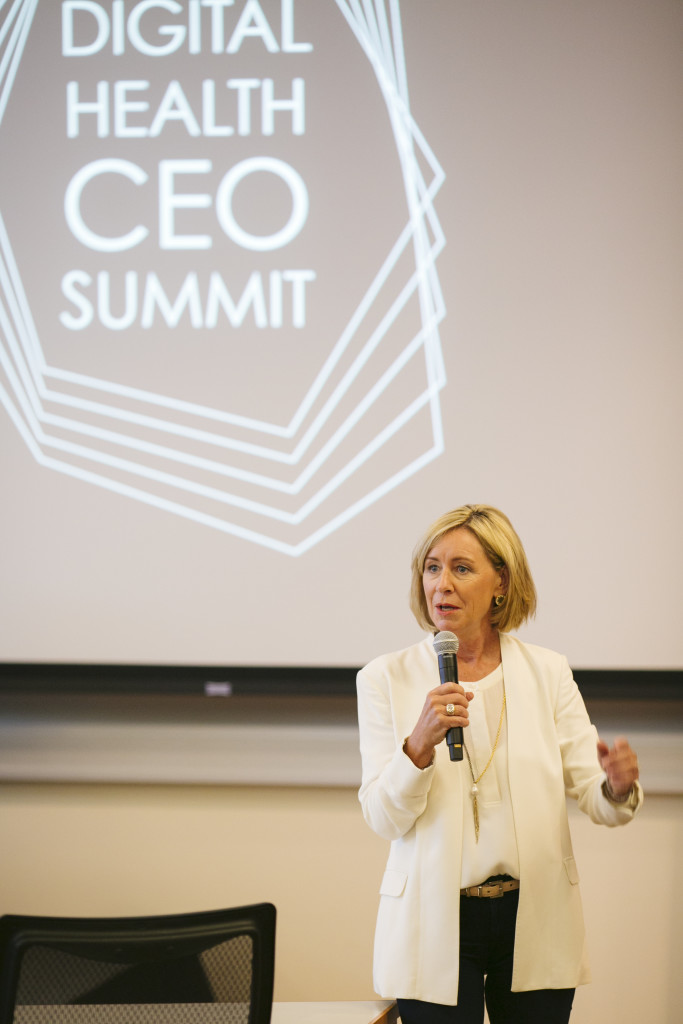What 140 CEOs want you to know about digital health
We recently brought over 140 CEOs together for off-the-record discussions on building a healthcare technology company at our annual Digital Health CEO Summit, co-hosted with Wharton | SF and Ropes and Gray. The wealth of knowledge shared during the day was staggering, so we couldn’t help but choose a select few tips to share from conversations that covered everything from security and policy, to recruiting and business models.
Growing and retaining your team
• “Our referral bonus structure is to pay employees for successful referral hires—it’s a heck of a lot cheaper than paying a recruiter.”
-Kevin MacDonald, Kit Check
• “The best employee referrals via investors have come from non-traditional firms who can dedicate more time and energy to you.”
-Seth Sternberg, Honor
• “You have to pitch your employees just like you pitch investors. They’re getting options and investing their time and sweat—which is arguably a lot harder as it’s probably their sole investment.”
-Seth Sternberg, Honor
• “Creating a goal-setting process often involves growing pains. Part of that may be due to the pressure employees feel to score perfectly on defined goals. Mango has found success in a more holistic approach to setting goals with its employees. We focus on the ultimate end goal of growing as individuals and as a company: it’s more about valuing the process itself over the score.”
-Caitlin Collins, Mango Health
• “Discuss the technical challenge when recruiting engineers. You can’t take a great engineer and have them work in an environment of, “I’m changing the world with smart people but I’m really bored when I’m writing my code.” Talk to your existing engineers and ask them what’s challenging about the role that will get others excited.”
-Seth Sternberg, Honor
• “It’s not pay that increases retention—it’s actually enabling and respecting your employees.”
-Seth Sternberg, Honor
• “OKRs at their core are about communication, alignment, and accountability. Everyone, including the CEO, should have public OKRs.” (Performance measurements based on Objectives and Key Results)
-Caitlin Collins, Mango Health
“Pitch your employees just like you pitch investors.”
Thinking like a VC
• “A good investor should have:
1) True conviction in your business.
2) Judgment. By nature, investors helicopter in because they have other jobs. Having good judgment means they’re going to see information and not make snap judgments—and know that their voice carries a lot of weight. They’ll seek out more information and be respectful of the decision-making process.
3) The ability to also tell a story. This is important for when we use investors to close candidates that are possibly considering other options and representing our company to other stakeholders. They need to be as good a representative about us as we are.”
-David Vivero, Amino
• “Never ever take an intro from someone that you don’t think is rock-solid.”


On playing by the (regulatory) rules
• “If your product is regulated, do not hide from the FDA. Talk to them early and find supporters in the agency. The FDA is more diverse than you might think and people in leadership are often more capable of collaborating with you. If you are able to share your insights into health tech and communicate new ways of doing things, you do have a chance to shape their thinking—and they are open to that.”
-George Savage, Proteus Digital Health
• “My first call when I’m looking a new solution is to IT and security.”
• “People confuse compliance with security. Compliance is just doing the least you can do to operate in a regulated environment. It’s a mistake to approach security as just doing the bare minimum to comply with specific HIPAA requirements.”
-Chas Ballew, Aptible
• “What’s worked for us in policy is finding a small group of people in government, (HHS, White House, etc.) who believe in what we’re doing and relying on them to pull us in.”
-Noga Leviner, PicnicHealth
• “Big companies are sometimes the least likely to influence policy because their lawyers have a much stronger voice in the company and are scared of how it will impact the rest of the company. Generally it’s smaller, scrappier companies that are willing to push back on policy. Smaller companies also have a narrower focus, so they can understand how legislation will affect the whole of their business.”
• On the complexities of healthcare regulations: “I got an MBA. I wish I got a JD.”
-Ian Shakil, Augmedix
“The FDA is more diverse than you might think. You have a chance to shape their thinking—and they’re open to that.”
Running a digital health business
• On pilots: “We don’t do anything for free. That’s a disaster because the pilot partner won’t pay attention to you.”
-Joanna Strober, Kurbo Health
• “Control your own messaging. Losing that is the thing that will cause death.”
-Helena Plate-Zyberk, SimpleTherapy
• “You have to be shameless with asking your network for help. When people are invested in a company, most like to be invested with more than just capital.”
-Sean Brecker, Headspace
• “Without a dedicated healthcare person, we taught our company like a research project for the first few months. You need to treat healthcare with the respect it deserves.”
-Chase Hensel, Welkin Health
• On running a digital health startup: “I’m trying to run a lean start up—but in molasses.”
-Denise Terry, EmbraceFamily Health
• “When talking to partners, policy makers etc., remember that they also know the pain of healthcare—because they’re patients too.”
Building a brand in healthcare
• “Bring a bunch of outsiders in to show you your blind spots. And also bring insiders in when you’re an outsider.”
-Chip Conley, Airbnb
• “You need to build a brand that the physicians know about and trust. Physicians need to be your advocates.”
• “To build a great healthcare business you need to have a thesis that is contrarian and a brand that is trusted.”
• “The hard part about making health products sticky is that there isn’t an immediate benefit.”